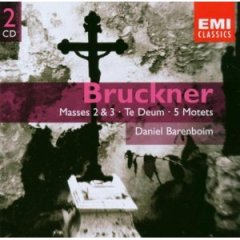Anton Bruckner - Mass 2 & 3 • Te Deum • 5 Motets (2003)
Anton Bruckner - Mass 2 & 3 • Te Deum • 5 Motets (2003)

CD1
1. Mass No.2 in E Minor I.Kyrie 9:18
2. Mass No.2 in E Minor II.Gloria 6:16
3. Mass No.2 in E Minor III.Credo 10:30
4. Mass No.2 in E Minor IV.Sanctus 4:31 play
5. Mass No.2 in E Minor V.Benedictus 6:32
6. Mass No.2 in E Minor VI.Agnus Dei 6:08
7. Te Deum Te Deum laudamus (choir/solo quartet) 6:02
8. Te Deum Te ergo quaesumus (solo quartet) 2:53 play
9. Te Deum Aeterna fac cum sanctis tuis (solo quartet/choir) 1:18
10. Te Deum Salvum fac populum tuum (solo quartet/choir) 6:32
11. Te Deum In te, Domine, speravi (choir/solo quartet) 6:00
CD2
1. Mass No. 3 in F minor Kyrie 10:24
2. Mass No. 3 in F minor Gloria 10:07
3. Mass No. 3 in F minor Credo 17:36
4. Mass No. 3 in F minor Sanctus 2:13 play
5. Mass No. 3 in F minor Benedictus 8:19
6. Mass No. 3 in F minor Agnus 9:22
7. Motets Ave Maria 3:12
8. Motets Christus factus est 4:34
9. Motets Locus iste 2:46
10. Motets Os justi 3:34 play
11. Motets Virga Jesse 3:07
CD1
1-6 Mass No.2 in E minor
John Adlis Choir (Chorus Master: John Adlis)
English Chamber Orchestra
Daniel Barenboim
7-11 Te Deum
Anne Pashley (s), Birgit Finnilä (ca), Robert Tear (t), Don Garrard (bs)
New Philharmonia Chorus (Chorus Master: Wilhelm Pitz)
New Philharmonia Orchestra
Daniel Barenboim
CD2
1-6 Mass No.3 in F minor
Heather Harper (s), Anna Reynolds (ca), Robert Tear (t), Marius Rintzler (bs)
New Philharmonia Chorus (Chorus Master: Wilhelm Pitz)
New Philharmonia Orchestra
Daniel Barenboim
7-11 5 Motets
New Philharmonia Chorus
Wilhelm Pitz
Bruckner wrote a Te Deum, settings of various Psalms (including Psalm 150 in the 1890s), various motets (among them settings of Christus factus est pro nobis and Ave Maria), and at least seven Masses. His Requiem in D minor of 1849 is the earliest work Bruckner himself considered worthy of preservation. It shows the clear influence of Mozart's Requiem (also in D minor) and similar works of Michael Haydn. His early Masses were usually short Austrian Landmessen for use in local churches and did not always set all the numbers of the ordinary. The three Masses Bruckner wrote in the 1860s and revised later on in his life are more often performed. The Masses numbered 1 in D minor and 3 in F minor are for solo singers, chorus and orchestra, while No. 2 in E minor is for chorus and a small group of wind instruments, and was written in an attempt to meet the Cecilians halfway. The Cecilians wanted to rid church music of instruments entirely. No. 3 was clearly meant for concert, rather than liturgical performance, and it is the only one of his Masses in which he set the first line of the Gloria, "Gloria in excelsis Deo", and of the Credo, "Credo in unum Deum", to music. (In concert performances of the other Masses, these lines are intoned by a tenor soloist in the way a priest would, with a line of plainsong).
Bruckner's motets have been called symphonies in miniature, teeming with overt dynamic and emotional range, often within just the span of a few measures. They are therefore almost perfectly suited to the Corydon Singers, who perform this selection of motets with an almost operatic fervor. Aside from Dennis Keene's Voices of Ascension, I have never heard another choir approach sacred music with such intensity and exquisitely soloistic vocal technique. Listen for example to the basses' solo line "a deo" in the "Locus Iste," and you will hear it performed as grippingly as Bruckner intended. I wouldn't necessarily want to hear them perform Händel, but in this repertoire they are unmatched. –Eric Westby
These wonderful pieces of liturgical music represent the peace and purity Bruckner found through his faith in God. The writing is at times simple...as it should be...but this simplicity only serves to accentuate the tranquility and beauty of these works. Bruckner the symphonist and Bruckner the devout Catholic. Much like Bach, Bruckner's music bears witness to God and I even find myself truly believing when listening. In this day and age of largely agnostic and God-less music, it is Bruckner's music which I find so dear and it will forever remain so for those in need, due to its intrinsic spiritual and faithful character. –Bruckerian2006
download: uploaded anonfiles mega 4shared mixturecloud yandex mediafire ziddu
Last Updated (Monday, 23 September 2013 22:57)








